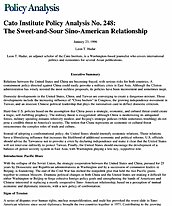Domestic developments in the United States, China, and Taiwan are converging to create a dangerous mixture. Those developments include the increasing influence of “China bashers” in Congress, the growing independence movement in Taiwan, and an insecure Chinese political leadership that plays the nationalism card to deflect domestic criticism.
Hard-line U.S. policies based on the assumption that China poses a strategic, economic, and cultural threat could create a tragic, self-fulfilling prophecy. The military threat is exaggerated; although China is modernizing its antiquated forces, military spending remains relatively modest, and Beijing’s strategic policies (while sometimes troubling) do not pose a credible threat to America’s security. The notion that China represents an economic or cultural threat misconstrues the complex roles of trade and culture.
Instead of adopting a confrontational policy, the United States should intensify economic relations. Those relations have a liberalizing influence that increases the likelihood of additional economic and political reforms. U.S. officials should advise the Taiwanese not to provoke a crisis by declaring independence and make it clear that the United States will not intervene militarily to protect Taiwan. Finally, the United States should encourage the development of a balance-of-power security system in East Asia, with Washington playing a low-key, supportive role.

